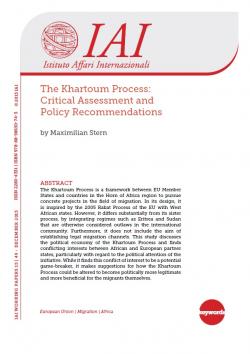The Khartoum Process: Critical Assessment and Policy Recommendations
The Khartoum Process is a framework between EU Member States and countries in the Horn of Africa region to pursue concrete projects in the field of migration. In its design, it is inspired by the 2005 Rabat Process of the EU with West African states. However, it differs substantially from its sister process, by integrating regimes such as Eritrea and Sudan that are otherwise considered outlaws in the international community. Furthermore, it does not include the aim of establishing legal migration channels. This study discusses the political economy of the Khartoum Process and finds conflicting interests between African and European partner states, particularly with regard to the political attention of the initiative. While it finds this conflict of interest to be a potential game-breaker, it makes suggestions for how the Khartoum Process could be altered to become politically more legitimate and more beneficial for the migrants themselves.
-
Details
Roma, IAI, December 2015, 18 p. -
Issue
15|49 -
ISBN/ISSN/DOI:
978-88-98650-74-3
1. Background
2. The EU’s Global Approach on Migration and Mobility (GAMM)
2.1 The Rabat Process
3. The Khartoum Process
3.1 The political economy of the Khartoum Process
4. Political assessment
Conclusion
Recommendations
References



